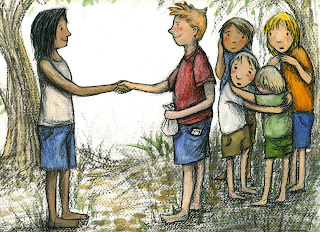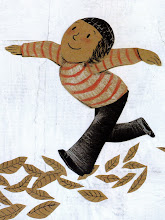 The second story I was asked to write for the Sunday Age came with a new challenge. This time the editor wanted to publish a two-part story for children over two Sundays. This is harder than it sounds. I knew that each story would have to feel fully resolved enough not to be frustrating for the reader but that I would also need a cliffhanger at the end of part one to make my reader want to read the second part.
The second story I was asked to write for the Sunday Age came with a new challenge. This time the editor wanted to publish a two-part story for children over two Sundays. This is harder than it sounds. I knew that each story would have to feel fully resolved enough not to be frustrating for the reader but that I would also need a cliffhanger at the end of part one to make my reader want to read the second part. Old Hannah’s Hut.
PART ONE:
At the top of Blind Man’s Bluff, at the end of a rocky, winding track, there is a falling down old hut like a crumbling piece of gingerbread. Nobody takes the track right to the end of the Bluff, even though it’s the shortest route to the beach because everybody knows that Old Hannah Stringbean lives in that hut.
And everybody knows that Old Hannah Stringbean eats children.
Last summer, Billy O’Donohue dared the new kid three footy cards and a bag of mixed lollies to take the shortcut to the beach past Old Hannah’s hut. The new kid, Emilio Something-Or-Other, had floppy black hair and a crooked smile and he looked like the kind of kid I’d like to be friends with. But only Billy O’Donohue talks to the newbies ’cause his dad runs the caravan park. Billy is the boss of our gang.
It’s easy to tell the difference between the newbie kids and us locals because newbies are usually pale and blotchy and they squint into the sun. But Emilio was different. He had dark skin like ours and his eyes were like the smooth black trading stones us kids dig out from Dead Man’s Creek. Nobody knew where he came from or where he was staying. He sure wasn’t a parkie or Billy would’ve known everything about him. He got me dead curious. Sometimes I would see him watching us from a distance with those dark stone eyes while we did our gang things.
So one day Billy gave him the dare.
On the day of the dare there was no wind. This is unusual for the bluff. Down on the beach you’re protected from the wind by the cliff face that towers above like a great hulking ogre. But up on the bluff you have to walk close to the ground, bent forward like a hairpin, so as not to be swept over the edge. Usually us Bluff kids take the long way to the beach, round the cliff edge and past the caves. It’s a horrible, blustery walk, and your calves get all scratched up by the blackberry bushes, but nobody ever takes the shortcut past Old Hannah’s hut.
Us kids would rather get scratched up than eaten any day.
We all gathered at the track, Billy, me, and the rest of the gang. Even the twins were there and they never usually come up to the bluff. Billy stood facing Emilio, who flicked his long black fringe out of his eyes. I liked the way he stood there, all silent and still like a tree, with the rest of us all jumping around and jittery.
Suddenly, three footy cards and a measly pack of mixed lollies didn’t seem like something worth dying for. I wondered if I should warn Emilio about Old Hannah. But Billy shot me a fierce warning look before taking Emilio’s outstretched hand.
‘See you down at the beach then?’ Billy said to Emilio. He squeezed the newbie’s smooth dark palm in his suntanned freckly one.
Emilio nodded.
We watched him saunter down the track until he came to the giant paperbark, which was the furthest that any of us had ever dared to go. There Emilio paused. And did the strangest thing. Even though I was standing right at the back of the gang and was the furthest person away from him, Emilio looked me right in the eye. Only for a second, then he was gone.
One of the twins began to cry.
I knew then that it was up to me to save him. I looked at Billy who was standing with his arms tightly crossed, carefully watching the tree in case Emilio reappeared. Billy’s face twitched in disbelief and awe. I had to think fast. I guessed it was only a matter of minutes before Emilio would arrive at Old Hannah’s hut. An idea came into my head.
‘How do we know he sticks to the path and doesn’t just cut through the bush?’ I said to Billy.
Billy screwed up his face, thinking.
‘One of us has to go after him to check that he’s not cheating,’ I said.
‘Well I’m not going!’ Billy said and he glowered at the twins who trembled in fear.
Everyone in the gang spoke quickly, nominating someone else for the job. I couldn’t say anything or it would look suspicious but I knew it was only a matter of time before somebody nominated me.
‘Carla should go!’ one of the twins squeaked. ‘She’s the oldest!’ and suddenly everyone joined in: ‘Yes, Carla should go!’
‘Great!’ I sighed. ‘Typical! You owe me big time, Billy O’Donohue!’ I yelled as I jogged down the track.
Around the bend Old Hannah waited in her hut.

PART TWO
I ran down the track towards Blind Man’s Bluff. As I approached the giant paperbark, shedding long strips like sunburnt skin, I turned to look back at the gang. They were clustered together, motionless, mouths open, watching me in disbelief. Around the bend, at the end of the track, was the falling down hut where Old Hannah Stringbean sat waiting hungrily for any foolish kid to wander past. And now I was heading straight for it. All because of a stupid dare.
Old Hannah had been the source of all our nightmares for years. Billy O’Donohue had a cousin who knew a girl who had wandered into Old Hannah’s hut and had never come out again. The girl had been a newbie. She hadn’t known better. All us local kids knew that Old Hannah ate children.
Behind the hut, carved into the steep cliff-face, were the steps that provided the shortcut to the beach. Nowadays, since Old Hannah had moved in, if you met up with the gang at the Bluff Caravan Park, you had to go back along the main road and past the shops, which took ages, or skirt along the cliff to get to the beach. Nobody was game to take the steps behind Old Hannah’s hut any more.
I looked around. Emilio was nowhere in sight. I peered down the track into the dense bushland. There squatted the crumbling old hut. Two dark windows glowered at me. I crept slowly along the path, my heart pounding in my ears. In the distance I could hear the surf crashing against the cliff below. Sheltered by the steep incline was a little beach with snowy white sand and speckled pink cowrie shells. This beach belonged to our gang. It was the hardest beach to get to, but the only private place for us locals to meet when The Bluff swarmed with tourist kids over the summer. It was our secret beach. No newbies allowed. That’s where Billy and the gang would be waiting. I wondered how long they’d wait. Twenty minutes? An hour? A day?
I thought about Emilio then who, with his dark skin and darker eyes, seemed so different from all the other newbies, and how he had just turned up this summer from nowhere, hanging around our gang, watching us, and suddenly I knew why he had agreed to Billy’s stupid dare. If Emilio made it to the beach without being eaten by Old Hannah Stringbean, he would be the first newbie in the history of us Bluff kids to be accepted into our gang. I prayed that he had found another way through the bush. That Old Hannah hadn’t taken him. I had to make sure.
Ten more steps and I would be at the hut. Then seven, then five. I paused. From here I could almost see through the windows into the darkness of its belly. Those windows watched me hungrily. I tried to calm my heartbeat so that I could hear above its pounding. Was that the sound of crunching bones? Was Old Hannah feasting on poor Emilio? I should have never allowed the dare to take place. I should have stood up to Billy O’Donohue once and for all. If I made it through this, I wouldn’t listen to Billy O’Donohue ever again. Nobody would. If I made it to the beach alive, I would make myself leader of our gang. And Emilio would be second in charge. After all, I was the oldest. Who did Billy O’Donohue think he was? Just ’cause his dad ran the caravan park. That didn’t make him boss.
I took a deep breath and crawled up to the window to peer into the hut. There sat Old Hannah, with her back to me. Her long grey hair snaked down her hunched shoulders. She seemed to be gnawing on something. I felt faint with fear. I wanted to run away, but I had to know if Emilio was in there. As I watched, Old Hannah slowly pushed her chair back and stood. I leapt up. But then, before I could run away, I caught sight of someone sitting at the table across from her. I gasped. It was Emilio! As my mouth dropped open, he saw me and smiled. Striding over to wrench open the door he called out to me, where I stood frozen.
‘Carla!’ he called. ‘You took your time! Come in and meet my grandmother!’
********













